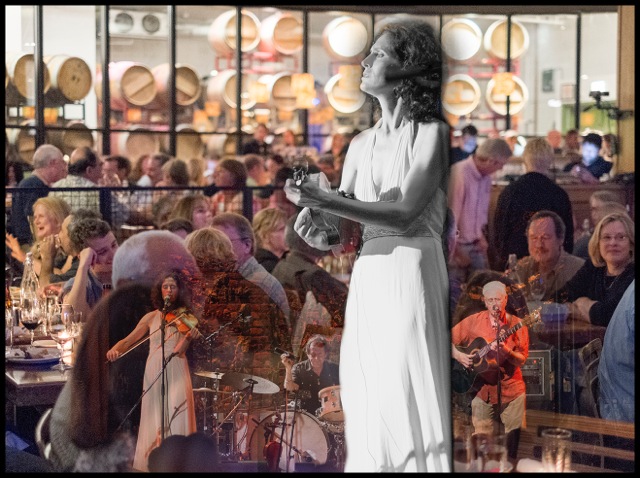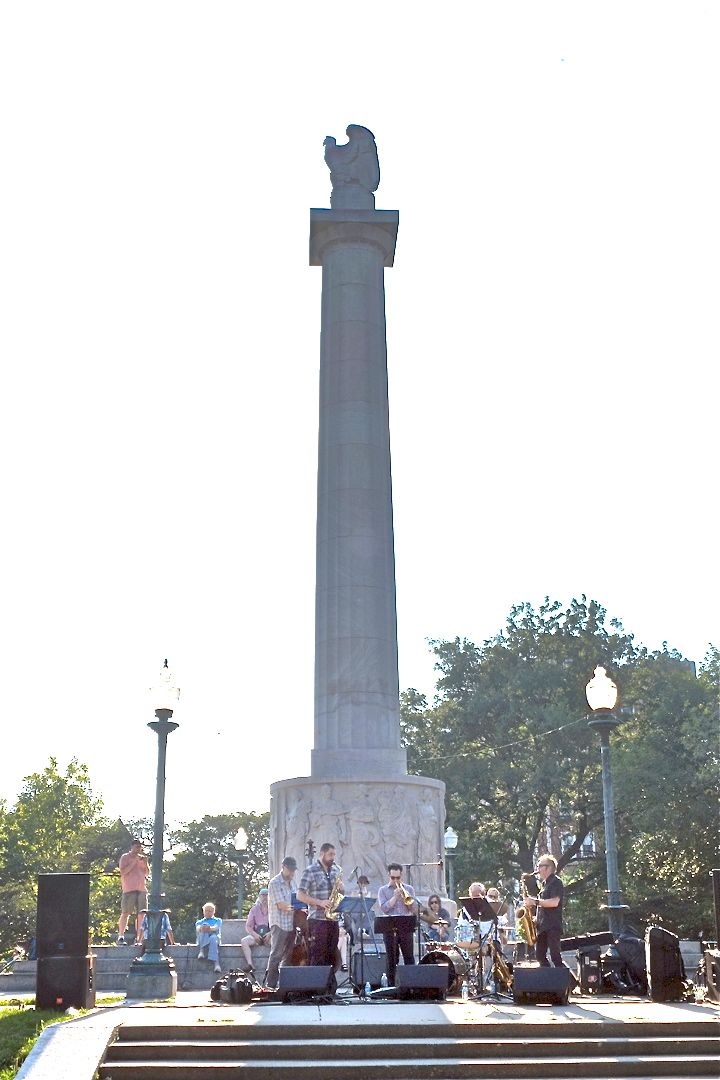Chicago is relatively new in bringing jazz to its many small, diverse parks but the Neighborhood Nights experiment, Â conducted by the Jazz Institute of Chicago, works just fine, as drummer Michael Zerang’s Blue Lights in Logan Square last Sunday proved. Last of these free shows is Saturday (tomorrow) at 1 pm at Woodson Regional Library on the South Side, featuring pianist Willie Pickens.
Zerang’s original compositions, many of them based on belly-dance music he’d grown up with, were performed by a front line of Chicago aces: tenor saxist Mars Williams, altoist Dave Rempus, cornetist Josh Berman, plus bassist Kent Kessler.  A mellow crowd comprising local residents, families and new music devotees gathered at 5 p.m. to sit on the grass that surrounds the Illinois Centennial Monument  (according to Wikipedia, designed by Henry Bacon, the Lincoln Memorial architect, and sculpted by Evelyn Longman). Despite the gig being held outdoors without a bandshell backdrop and with car traffic zipping past, the sound mix was terrific, courtesy of Michael’s brother Ziggy, a world-class engineer. The three-horn parts were rich and clear, the solos had weight and the leader’s percussion was defined with detail. In a more confined space Blue Lights may have energized listeners to get up, hoot and holler. On this perfect summer day, one couple was dancing and a boy of about 9 caught the spirit, moving as inspired.Chicago was rather early to feature jazz in bars  — speakeasies, during the Roaring ’20s — and that tradition lives on. Not just here, of course, but with a vengeance and variety that is second maybe to New Orleans and certainly rivals New York City.
Afterwards I looked in on the fabled Green Mill, a joint long ago owned by an Al Capone gang-member. It was full of couples out for the fun of joining a party that they were sure to find there, and hearing guitarist John Moulder with New York-based saxophonist Donny McCaslin, among others. The band was on break, and I’ll write more about the place in a future post. With my friend Jim DJazz, I went on to Constellation, an adventurous music room attached to a comfortable bar, all run by drummer Mike Reed. Constellation might have been a speak in another era — it’s in an out-of-the-way location, behind an entirely unprepossessing door. Jeff Parker, the AACM and Tortoise guitarist who moved from Chicago to LA, was playing with his trio, but JdJ and I sat at the bar in conversation, so more on Constellation after the Roscoe Mitchell performance with Muhal Richard Abrams, this coming Sunday (8/17).
Constellation couldn’t be more different than City Winery, the commodious facility opened two years ago by Michael Dorf, who has a place by the same name in NYC. Dorf was co-founder of the original Knitting Factory, which started as a clubhouse showcasing downtown avant-gardists personified by John Zorn and became an empire. Full disclosure: I’ve had many dealings with Dorf, as the cd linked to my book Future Jazz came from Knitting Factory Records, and the Jazz Journalists Association has held its annual Jazz Awards event at City Winery NYC.
The Chicago club is even larger than its Manhattan progenitor, with ample outside  patio seating besides its main concert room, through which wine casks are visible behind glass windows in the rear, and a full-fledged restaurant. A glance at its upcoming schedule reveals that instrumental music is rarely booked and jazz seldom if ever presented.

Jennie Scheinman, with Bruce Cockburn (in orange) and drummer Gary Craig at City Winery, Chicago; photomontage by Marc PoKempner
To call what fiddler Jennie Scheinman played, when featured in Chi’s CW with guitarist-singer-songwriter Bruce Cockburn “jazz” is to stretch the definition way out of shape. Perhaps such a stretch would be productive for the genre, but the term might limit her, too.
Scheinman plucks and bows in a spare, sometimes stark fashion, and has a keening high-plains voice that echoes back to the Carter Family or other old timey musicians of Appalachia. She also has an acute sense of nuance which enriches the lyrics she’s written, mostly about life in Northern California — songs like the one titled “Deadheads,”  that apply the slow, sweet headiness presumably characteristic of the region’s residents to her vision of a county out-of-time.  Her stories are humorous, dry, nostalgic and forward-thinking, all at once. Her playing is blessed with an inherent swing and she dips convincingly into the blues.
Not jazz? So what? Scheinman has played jazz in drummer Alison Miller’s band, with guitarist Bill Frisell and elsewhere. Her solo performance here included little improvisation. She opened for Coburn, whose oeuvre has an earnest folky quality, and also joined him playing obligatos. Gary Craig played hand drums on one of her songs, and traps kit for Cockburn. No, drums don’t make it jazz either. Americana is probably the appropriate current label. I like that, too. This blog is intended to be about the real thing, the jazz beyond “jazz.” Jennie has that.
[contextly_auto_sidebar id=”iuS0JOb5OoLl8EyZS2xkJ3Ch6mxMEjer”]

